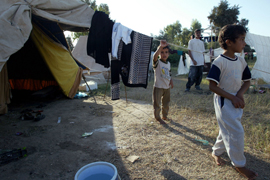Iraq war enters sixth year
Bush to concede “high cost” but also defend invasion in anniversary speech.

In extracts of the speech released by the White House, he acknowledges that the war has “come at a high cost in lives and treasure”, but defends both the decision to invade and to boost the number of US troops in Iraq last year.
Invasion aftermath
The 2003 invasion plunged Iraq, a country of 26 million people, into chaos and bloodshed.
Iraqis and US forces still face daily attacks from armed groups, and fighting between armed factions from both sides of Iraq’s Sunni-Shia sectarian divide rages on.
The economy, the main concern of Iraqis after security, is a shambles.
In his speech, Bush says that “removing Saddam Hussein from power was the right decision – and this is a fight America can and must win”.
He says last year’s troop build-up has turned Iraq around and produced “the first large-scale Arab uprising against Osama bin Laden.
“The challenge in the period ahead is to consolidate the gains we have made and seal the extremists’ defeat”.
‘Hard experience’
In the Pentagon speech, Bush further says: “We have learned through hard experience what happens when we pull our forces back too fast – the terrorists and extremists step in, fill the vacuum, establish safe havens and use them to spread chaos and carnage.
| Your Views |
“The successes we are seeing in Iraq are undeniable, yet some in Washington still call for retreat.
“The surge has done more than turn the situation in Iraq around – it has opened the door to a major strategic victory in the broader war on terror.
“For the terrorists, Iraq was supposed to be the place where al-Qaeda rallied Arab masses to drive America out. Instead, Iraq has become the place where Arabs joined with Americans to drive al-Qaeda out.
“In Iraq, we are witnessing the first large-scale Arab uprising against Osama bin Laden, his grim ideology, and his terror network. And the significance of this development cannot be overstated.”
Critics unimpressed
Critics of the Iraq invasion are not impressed.
They are planning hundreds of protests around the world.
Even General David Petraeus, the commander of US forces in Iraq, admits that the country has made insufficient progress towards national reconciliation.
Hady Amr, a Middle East analyst at the Brookings Institution in Doha, Qatar, told Al Jazeera that the US-led invasion of Iraq was a strategic disaster.
He said: “When you have at least 200 Iraqis dying every month in attacks on a per capita equivalent … I don’t know how anyone can characterise that as a success.”
“The US took a country that had a lot of problems, a totalitarian state, and turned it into a haven for terrorism.”
Deteriorating situation
So far, the war has killed more than 4,000 US and allied soldiers and tens of thousands of Iraqi civilians.
Between 104,000 and 223,000 died between March 2003 and June 2006 alone, according to the World Health Organisation.
The International Committee of the Red Cross, in its latest report, said the plight of millions of Iraqis who still have little or no access to clean water, sanitation or health care was the “most critical in the world”.
 |
|
More than two million Iraqis have fled the |
Iraq‘s parliament has been paralysed by competition between parties driven by sectarian interests.
Last year the US embassy in Baghdad documented a high level of corruption at all levels of government, and questioned the willingness of Nuri al- Maliki, the Iraqi prime minister, to crack down on crooked practices.
Nevertheless, there has been progress towards peace in large areas of southern and central Iraq, where the situation is far less violent than it was even a year ago.
An increase or “surge” in US forces, which over the past year increased the level of troops to more than 160,000, has helped reduce the violence, and tens of thousands of Sunni former armed groups have been recruited to fight al-Qaeda.
At the same time, Muqtada al-Sadr, the Shia leader, has ordered his powerful Mahdi Army militia to refrain from attacks on Iraqi civilians and security forces.
Armed groups, however, continue to carry out spectacular attacks.
Failed economy
The economy is a mess, with unemployment is running at between 25 and 50 per cent of the workforce, according to government figures.
Oil exports are the country’s main money earner and a key source of contention between rival political factions.
Iraqi officials say production is at 2.9 million barrels a day, higher than pre-war levels, oil analysts believe it is really around 2.2 million.
Public services like water and electricity have yet to be fully restored, despite billions of dollars having been spent on often badly managed reconstruction projects.
Government calls for Iraqi refugees to return to help rebuild the country have been largely ignored. Fewer than 50,000 have returned from neighbouring Jordan and Syria, while more than two million have fled.